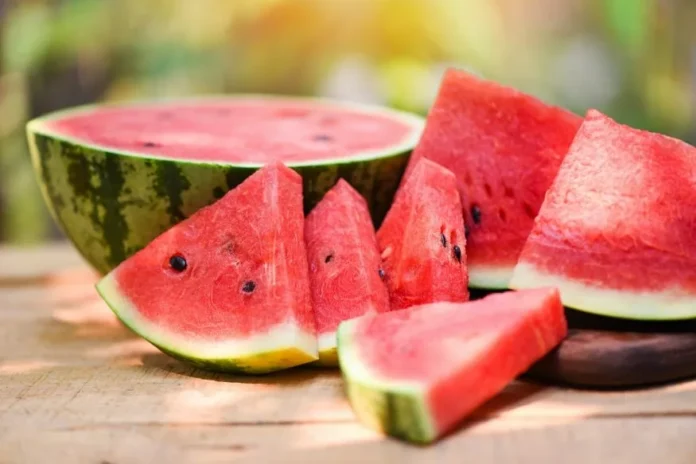Watermelon is a popular fruit loved by many, especially in hot climates. People enjoy it not only because it’s sweet and juicy, but also because it helps quench thirst during periods of intense heat.
This centuries-old fruit, known for its bright red flesh and numerous small seeds, is rich in nutrients and antioxidants, including vitamins A and C.
Apart from being sweet and refreshing, watermelon offers a wide range of health benefits. These benefits are mainly due to the fruit’s high water content and certain special compounds like lycopene (which gives it its red color) and citrulline.
Also Read: President Mahama suspends all activities, declares three days of national mourning
Watermelon as a Natural Enhancer of Male Performance
Watermelon is a natural source of citrulline, an amino acid that supports better blood circulation. This compound can help improve erectile function in men by increasing blood flow to the penis, allowing for an erection even without direct stimulation.
Research has shown that citrulline in watermelon can help men experiencing mild performance issues by improving blood flow to the penis. That’s why some even refer to watermelon as a natural Viagra.
Health Benefits of Watermelon
Here are some of the key health benefits of watermelon:
1. Keeps the Body Hydrated
Watermelon is made up of 92% water, which helps the body stay hydrated. Proper hydration is essential for all body functions, especially in hot weather.
2. Reduces Muscle Soreness
If you experience muscle soreness after intense exercise, watermelon may help. Its citrulline content helps reduce post-exercise pain without upsetting the stomach like some pain relievers (e.g., ibuprofen). Drinking two cups of fresh watermelon juice before exercise may ease muscle discomfort.
3. Supports Heart Health and Blood Circulation
Watermelon promotes heart health. Lycopene, the red pigment in the fruit, helps lower blood pressure and cholesterol levels. The citrulline (especially concentrated in the white part of the rind) converts to arginine in the body, which helps produce nitric oxide, a compound that relaxes blood vessels and improves circulation.
4. Improves Sexual Performance (Erectile Dysfunction)
Studies suggest that 3.5 servings of red watermelon per day may provide enough citrulline to support erectile function. Interestingly, yellow watermelon contains about four times more citrulline than red varieties, so just one serving may be sufficient.
5. Supports Kidney Health
Thanks to its high water content, watermelon helps flush out toxins from the kidneys and may prevent the formation of kidney stones in some individuals.
6. Boosts Immunity and Eye Health
Watermelon contains vitamin A, which is vital for healthy vision and skin, and vitamin C, which helps the body fight infections and maintain a strong immune system.
7. Promotes Healthy Skin
Watermelon provides both vitamin A and C, which are important for skin health. Vitamin C, whether consumed or applied to the skin, aids in collagen production — a protein that keeps the skin youthful and hair strong. Vitamin A helps create and repair skin cells.
8. Helps Manage Blood Sugar
Watermelon has a low glycemic load and contains few carbohydrates, making it a good option for those managing blood sugar levels or trying to reduce the risk of diabetes. It raises blood sugar more slowly than many other fruits.
Nutritional Profile (per 100g of raw watermelon):
Energy: 30 Kcal
Carbohydrates: 7.55g
Fiber: 0.4g
Protein: 0.61g
Fat: 0.15g
Iron: 0.24mg
Folate: 3µg
Cholesterol: 0mg
Saturated Fat: 0.016g
Monounsaturated Fat: 0.037g
Polyunsaturated Fat: 0.050g
Watermelon: A juicy fruit with powerful health benefits
Yes, watermelon seeds are not only safe to eat — they’re also highly nutritious. Health experts say watermelon seeds have less sugar and more fiber than the fruit’s flesh and also contain citrulline.
Whether eaten raw or dried, watermelon seeds are rich in magnesium and folate, which support proper body function and disease prevention. These seeds also contain healthy fatty acids that help lower bad cholesterol, reducing the risk of heart attacks and strokes.
While research shows that melons in general are good for your health, more studies are needed to fully understand the specific health impacts of watermelon and its components.


